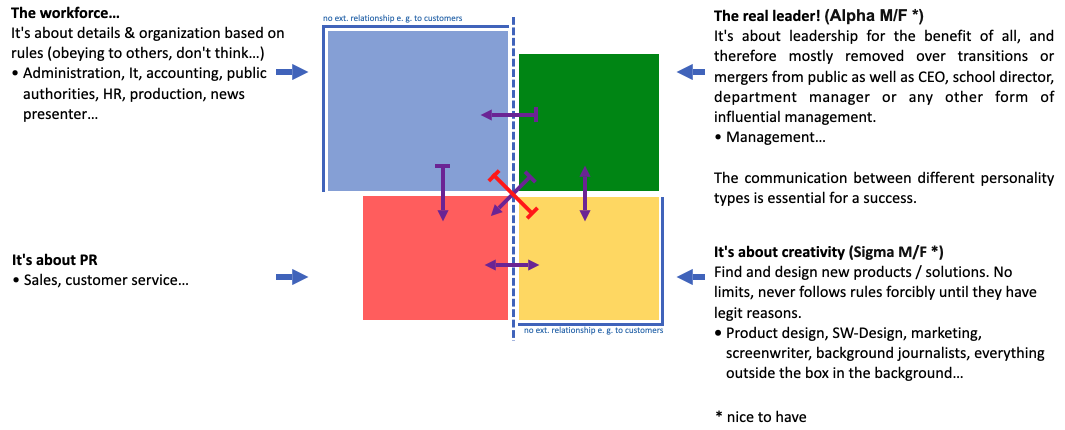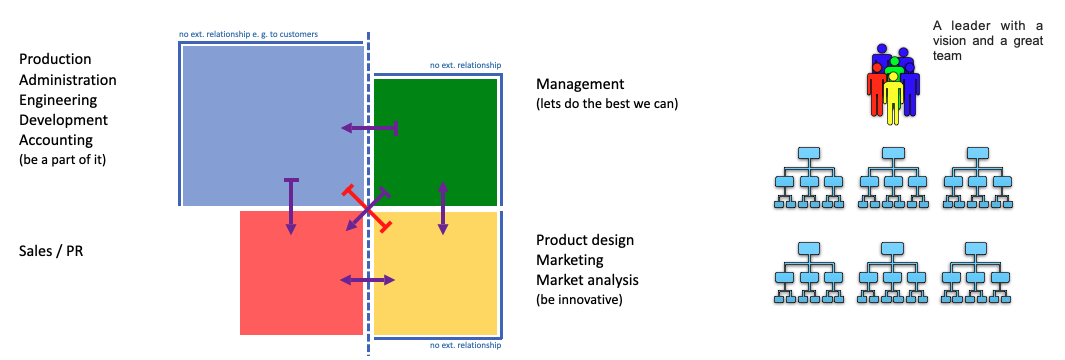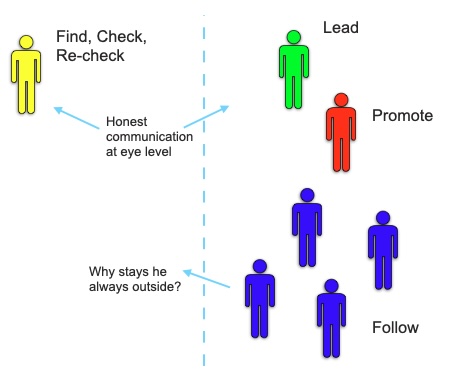Personality traits
In this blog post, I would like to point out two specific types with certain personality traits that are important when forming groups as it relates to leadership, creativity, success, as well as control in communication between sender and receiver. The other known types are not discussed here because they exhibit less dominant behavior and may be less prominent than an Alpha-type (Green), or Sigma-type (Yellow). Further, they all have a Mindset (way of thinking), while the Sigma type has a Grind Set (work ethic and dedication). See:
- Mindset / Grind set
- Prominent examples of alpha types
- Prominent examples of sigma types
- Conflict-oriented world and selection of certain personality types
The dynamics of each type have far-reaching effects on schools, families and clubs. By understanding the strengths and challenges of these personality types, targeted measures can be taken to improve communication and collaboration. Sigma children in Beta-dominated environments in particular need support to develop their unique skills while feeling socially integrated. A balanced approach can both promote individual strengths and create a harmonious and productive environment.
Alpha types can contribute significantly to the success and development of clubs through their leadership, vision and strategic skills, even if they are not active in day-to-day operations. By specifically involving them in advisory and strategic roles, project-related tasks and mentoring programs, their competence can be used effectively to move the club or group forward and achieve its goals.
The model shown is an extension of traditional personality models and emphasizes dealing with rules and critical thinking as key differentiators, it uses various approaches from psychology and organizational theory. It shows four different personality types, based on dealing with rules and how they communicate with each other.

Overview of types
- Alpha Type:
- Exhibits dominant behavior and leadership qualities.
- Strives for power, prestige, and social status.
- May take a leadership role in social groups.
- Is often self-confident and decisive.
- Can assume a social responsibility.
- Beta Type:
- Exhibits adaptive and cooperative behavior.
- May take less dominant positions in social groups.
- Emphasizes harmony and cooperation.
- Can be empathic and sensitive.
- Requires clear guidelines and rules.
- Sigma Type:
- Acts independently of social norms and hierarchies.
- Critically rethinks rules and behaviors, is therefore an important interlocutor.
- Strives for individual freedom and independence.
- Can be withdrawn and introverted.
- If leadership qualities are required, represents and assumes the role of an alpha type.
- Can develop innovative solutions to any type of problem, find unconventional approaches to community projects.
- Omega type:
- Prefers to be alone and can distance himself from social groups.
- Has little interest in social hierarchies or norms.
- May be considered an outsider or loner.
- Gamma Type:
- Does not always fit into the classic alpha or beta categories.
- Demonstrates independent thinking and action.
- May exhibit alpha like characteristics in certain situations.
- Delta type:
- Is solid, reliable, and hardworking.
- May focus less on social hierarchies or leadership roles.
- May show good teamwork and cooperation.
- Requires clear guidelines and rules.
- Theta type:
- Is relaxed, calm, and spiritual.
- Strives for inner satisfaction rather than outer success.
- May be less focused on social status and power.
It is important to note that the terms, or concepts, Alpha to Theta are not set in stone, as people may exhibit different behaviors depending on the context and situation, or may adapt to different environments and requirements. Their behaviors can therefore be multi-faceted.
Introverts are not necessarily shy or passive. They can be just as confident, decisive, and proactive as extroverts, although they tend to draw their energy from observation. So an introverted Sigma type might step in and take on the role of an Alpha type at moments when their leadership skills are needed or they have a strong opinion. Therefore, it is possible for an introverted Sigma type to act as an Alpha type in some situations and act as a Sigma type in others.
Failure companies / Authorities! (conflict oriented world)
It’s about control: In this case, a little / no real external relationship, almost no marketing / no sales over traditional ways / no sales over traditional ways / no innovation / ineffective. Globalist companies, government authorities are built this way. It’s all about obeying and fighting each other.

Creative companies! (the world without many words)
It’s about innovation: In this case, a little / no real external relationship, but creative products / solutions / usability / design. Exceptional in marketing and sales. (S. Jobs Apple / Tesla) See also prominent examples of sigma types.

Success of “old / real private“ businesses! (the harmony)
It’s about harmony: In this case, a real external relationship, creative products / solutions / usability / design. Exceptional in sales.

Personality types are important (act as a group)

Alpha
People who show their strength through their inner confidence, and prove it through the way they interact with others, while always being kind, considerate and respectful because they are real leaders and they always have a good relationship to the outside. It’s about the success for all.
(interested in power, prestige and status, formal clothing / formal watch, cuff links, tie, car, formal role model)
Sigma
People who are always outside the social hierarchy and thus rarely follow ideas or rules that they themselves consider pointless and inefficient. This is because they have to look for different solutions outside their own world and always for the best possible outcome.
(not interested in power, prestige and status, unique clothing / unique watch or car, unique role model)